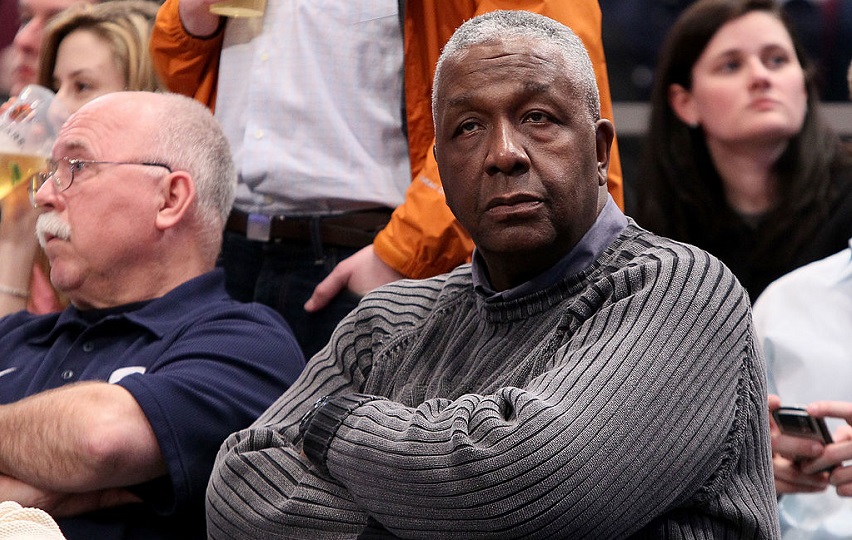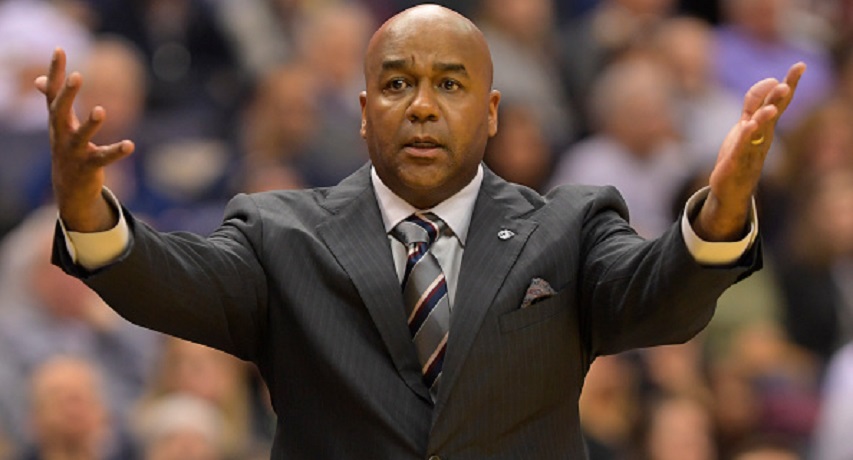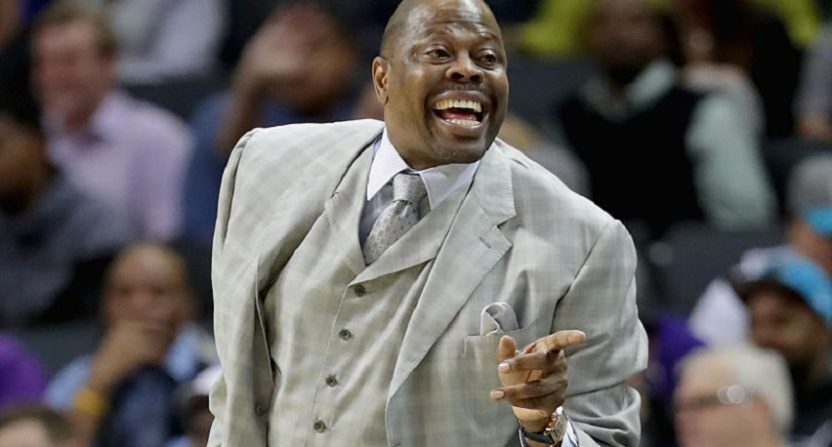Has the Georgetown basketball program backed itself into a corner, giving itself no other option than to hire former star Patrick Ewing as the Hoyas’ next coach?
During Sunday’s off-day between the Final Four and the national championship game, Sports Illustrated‘s Pete Thamel reported that Georgetown was the prevailing topic among coaches, executives, agents and media during what is typically a coaching convention for college basketball. Unfortunately for the Hoyas program, rumblings about the Georgetown head coach opening wasn’t of the “Hey, that’s an intriguing job; I wonder who’s going to take it” variety. According to Thamel, most of the chatter concerns how badly Georgetown has botched this head coaching search.
On the heels of Thamel’s story comes Yahoo! Sports’ Adrian Wojnarowski reporting that Ewing is interviewing for the Georgetown job on Monday. Currently the Charlotte Hornets’ associate head coach, Ewing is frequently mentioned for NBA head coaching openings. First and foremost, the 11-time All-Star paid his coaching dues by grinding as an assistant for the past 14 years with the Rockets, Magic and Hornets. But Ewing is a Hall of Famer, named as one of the NBA’s 50 all-time greatest players in history, whose name and accomplishments as a player would bring attention to any team that might hire him.
Ewing deserves a pro job. Has for years. College? That's a tough landscape to navigate with no experience. https://t.co/KNiu0vLimm
— Chris Mannix (@SIChrisMannix) April 3, 2017
Ewing’s résumé makes him a strong candidate for a NBA head coaching position, but he’s not the first name that comes to mind for such a job in college basketball. That is, of course, unless we’re talking about the job at Ewing’s alma mater.
The 7-foot center’s career at Georgetown was legendary. Ewing was a three-time consensus first team All-American, named the college national player of the year and twice earned Big East player of the year honors. Most importantly for his legacy, especially as it applies to Georgetown, Ewing helped lead the Hoyas to a national championship in 1984 and was named the Final Four’s most outstanding player. When people talk about Georgetown’s glory days, they are almost certainly referring to Ewing’s era from 1981 to 1985. (No disrespect meant toward Allen Iverson.)
But Ewing is also a strong link to the school’s past success, when the Hoyas were a national power under head coach John Thompson Jr. During his 27 season, Thompson was Georgetown basketball. The school won 71 percent of its games under Thompson’s tenure, earning bids to the NCAA Tournament 20 times with nine Big East championships and, of course, that national championship in 1984.

Since Thompson’s abrupt retirement in the middle of the 1999 season, Georgetown has struggled to find that same success. The Hoyas thought they had their man — who had a strong link to their greatest coach — upon hiring John Thompson III from Princeton in 2004. What better way to continue the Thompson legacy and restore Georgetown to prominence than with the legendary coach’s son?
Thompson III appeared to be well on his way to reaching the bar established by his legendary father early during his tenure as Georgetown coach. By his third season, the Hoyas reached the Final Four. That appearance looked like the first step to restoring Georgetown back to a national basketball power. But the subsequent 10 seasons didn’t go as planned. Georgetown earned six more NCAA Tournament bids (getting upset by mid-majors like Davidson and Florida Gulf Coast) and won two regular season Big East titles, but the program was steadily trending downward. Worst of all, Thompson III was losing the recruiting battle, watching stars from the Washington D.C. area like Josh Hart, Kris Jenkins and Markelle Fultz go elsewhere.
The past two seasons were the worst, with the Hoyas twice finishing under .500 and seemingly no sign of being able to turn things around. Despite that, the prevailing belief was that Thompson III wouldn’t be fired because his father still held a powerful role in Georgetown basketball. Obviously, John Thompson Jr. either lost that power struggle or had to acknowledge the obvious conclusion that a change needed to be made. Unfortunately, neither Thompson nor any of the other decision-makers in the Georgetown athletic department appear to have had a plan after dismissing Thompson III.

As Thamel reports, dysfunction within the athletic department and political machinations have handcuffed the Georgetown coaching search. Prospective candidates likely saw those issues as well, in addition to Thompson Jr.’s looming presence at the program, and either said no thanks, I’m good or decided to look elsewhere, not even interviewing with the school. Names like Texas’ Shaka Smart, Xavier’s Chris Mack and Notre Dame’s Mike Brey had no reason to leave their current positions.
“Instead of a stealth-and-seek search like the ones executed at Washington and Missouri, Georgetown stalled, boxing itself out from coveted names and then starting a hiring process with a ready, fire, aim approach. ‘If you’re going to fire him, you’d think you have it dialed up with a No. 1, No. 2 and No. 3 candidate,’ said an industry source. ‘How do you open yourself up to that? It leaves you vulnerable and in a position of weakness.'”
Harvard’s Tommy Amaker appears to be an ideal candidate for Georgetown’s opening, having revitalized his coaching career in Cambridge and putting himself in position for a step back up to a bigger program. But according to Thamel, Amaker is turned off by the politics swirling around the Georgetown gig. Would any coach be set up to fail if Thompson Jr. is angry that his son was fired?
Sources: Ewing has spent week identifying potential candidates to pursue as part of a high-level, experienced college coaching staff.
— Adrian Wojnarowski (@wojespn) April 3, 2017
That brings us back to Ewing. What if bringing in Thompson Jr.’s former player is the only way to appease the coaching legend? More than that, what if Ewing is the only one who’s truly interested in the job at this point? His son, Patrick Ewing Jr., was on Thompson III’s coaching staff at Georgetown, which might help overcome any unfamiliarity with the current roster and the college game. Furthermore, Wojnarowski reports that Ewing’s professional contacts and friends have been suggesting several candidates that could help him assemble a top-notch college staff. The head coaches Ewing worked under — Jeff and Stan Van Gundy, and Steve Clifford — have also been in contact with Georgetown to advocate for his head coaching qualifications.
All signs seem to point to Ewing becoming Georgetown’s next head coach. But is a coach with no college coaching experience the right guy to turn around the program, even if he has the endorsement and patience of his former mentor? If Ewing’s true ambitions are to coach in the NBA — and he was very close to getting the Sacramento Kings job last year — would failing at Georgetown taint those aspirations? Yet it increasingly looks like Georgetown and Ewing need each other, whether they’re right for each other or not.







